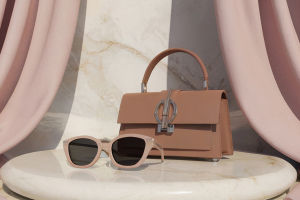Have you ever wondered why so many consumers remain fiercely loyal to luxury brands? Whether it's a timeless Chanel bag, an elegant Rolex watch, or a sleek Louis Vuitton suitcase, the allure of luxury brands runs deep.
For many, these brands represent more than just expensive items—they symbolize exclusivity, status, and a deep emotional connection. But what exactly is it that keeps consumers coming back, year after year?
In this article, we'll explore the power of brand loyalty and why it's so prominent in the luxury market.
Exclusivity and Prestige: The Ultimate Status Symbols
One of the primary reasons consumers are drawn to luxury brands is the feeling of exclusivity and prestige they offer. Owning a product from a high-end brand signals a certain level of status and success. Luxury brands often position themselves as more than just products—they are symbols of achievement.
This sense of prestige is not easily replicated, which makes luxury items highly desirable.
When we purchase a luxury product, we're not just buying an object; we're buying into an experience, a lifestyle, and a sense of belonging. As a result, these brands cultivate a community of loyal followers who associate the brand with their own identity and values. For many, it's not just about the quality of the product but also the recognition and respect that comes with owning something exclusive.
The Emotional Connection: More Than Just Products
But it's not just the tangible aspects of luxury that make us return for more. There's also an emotional component that keeps us attached to these brands. Luxury brands excel at creating strong emotional bonds with consumers through their marketing, storytelling, and customer experience.
Take, for example, the way luxury brands often weave heritage and craftsmanship into their messaging. We feel a deep connection when we learn about the meticulous attention to detail, the decades (or even centuries) of tradition, and the artistry behind each product. This storytelling aspect resonates with us on a personal level, making the products feel like more than just a purchase.
It becomes a part of our own narrative, a symbol of the milestones we've achieved and the aspirations we hold.
Quality and Craftsmanship: The Promise of Excellence
Another key factor in brand loyalty is the unparalleled quality and craftsmanship that luxury brands offer. When we buy a luxury product, we expect it to be of the highest standard, and often, these brands deliver on that promise.
The materials used, the attention to detail, and the precision with which each item is crafted create a sense of trust and reliability.
For consumers, this translates to a long-term investment. Many luxury goods, such as watches, handbags, or clothing, can stand the test of time and often even increase in value. As a result, customers feel more inclined to return to a brand they trust and admire, knowing they will get products that are built to last.
Exemplary Customer Experience: Going Beyond the Sale
Brand loyalty in luxury markets also stems from the exceptional customer experience these brands provide. From the moment we step into a boutique to the after-purchase care we receive, luxury brands understand the importance of treating their customers like VIPs.
The personalized service, the attention to detail, and the sense of exclusivity all contribute to a sense of loyalty.
Luxury brands take great care in ensuring that the entire journey, from discovery to purchase to aftercare, exceeds expectations. For example, some brands offer exclusive member benefits or personalized tailoring services, making customers feel valued and appreciated. This level of service creates an emotional connection that keeps us coming back, reinforcing the idea that we are not just consumers, but part of a special community.
Social Influence and Cultural Capital: The Role of Peer Pressure
In addition to personal emotional connections, social influence plays a significant role in fostering brand loyalty. The desire to belong to a certain social group or to project a particular image can drive people to remain loyal to luxury brands. In many societies, owning luxury items is associated with high social status and cultural capital.
Consumers are often influenced by trends, celebrity endorsements, and peer pressure. The widespread visibility of luxury goods in popular culture, social media, and even through influencer marketing, encourages people to buy into these brands. This social aspect further strengthens the emotional bond to the product, as it becomes not just a personal symbol but also a shared experience with others in a particular social circle.
Conclusion: The Unbreakable Bond
Brand loyalty in the luxury sector is a powerful force, shaped by a mix of emotional connections, social influence, and a commitment to excellence. It's not just about purchasing products—it's about aligning oneself with a brand that reflects personal values, aspirations, and social status.
Luxury brands excel at creating experiences that resonate deeply with consumers, making them feel part of something special.
As we continue to navigate a world of endless choices, luxury brands will likely remain a symbol of prestige, quality, and exclusivity. So, the next time you find yourself gravitating towards a luxury brand, remember that it's not just about the item itself but the entire emotional experience that it offers. What luxury brand are you loyal to? Let's hear your thoughts in the comments below!


